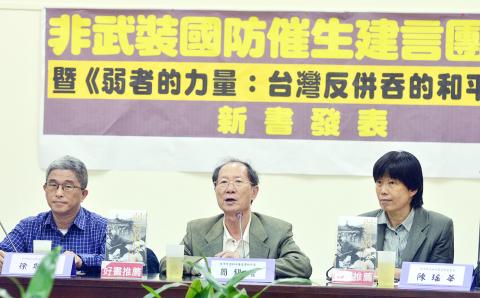Taiwan should develop a national defense strategy that incorporates nonviolent civil resistance in the event of a Chinese invasion, former Democratic Progressive Party (DPP) legislator Chien Hsi-chieh says in a new book, titled Power of the Weak (弱者的力量).
Chien, a long-time labor activist and expert in nonviolent resistance tactics, said the nation should establish a system of “nonviolent, civilian-based defense” that would coexist with military forces and act to paralyze a foreign authoritarian regime.
The strategy would require the entire population to receive education and training in civil disobedience tactics, with the government serving as a coordinator in sharing the experience of social activist groups with the rest of the public, he said.

Photo: Wang Yi-sung, Taipei Times
Nonviolent resistance is an urgent issue given the growing imbalance in military power between Taiwan and China and the increasing possibility the that the US might “abandon” Taiwan in the case of military conflict.
By adopting nonviolent methods, the public could claim a moral higher ground and create more international pressure on an invading regime, Chien said.
“We should apply methods of non-cooperation and disobedience to resist the annexation of Taiwan by the Chinese Communist Party regime,” Chien said.
Accompanied by representatives of activist groups at a Taipei news conference, Chien said he plans to lobby for legislation on the issue as well as seek support from all candidates running in next year’s presidential elections.
Taiwan could learn from the experiences of Lithuania or other Baltic states, which include both military security and civil resistance as part of their national defense strategy, Chien said.
In his book, Chien said that Lithuania’s strategy was largely inspired by its independence movement against the Soviet Union from 1988 to 1991, in which the entire public took part in coordinated actions of civil disobedience such as mass strikes, road blockades and passive resistance to Soviet laws.
Many other countries, such as Norway, Sweden, Denmark, Austria, the Netherlands and South Africa, also include similar principles in their national defense strategies, Chien said.
Academia Sinica researcher Hsu Szu-chien (徐斯儉) said he agreed with Chien’s view that civil resistance should not only be seen as a supplement to military force, but as a “powerful backing” for national defense.
Hzu said neighborhoods and communities should get involved in grassroots action in defense, disaster relief and social welfare.
“Instead of ‘national defense,’ we might put it as ‘community defense;’ in case of such a scenario, individual communities could declare themselves to be ‘non-cooperative communities,’” Hsu said.

US climber Alex Honnold is to attempt to scale Taipei 101 without a rope and harness in a live Netflix special on Jan. 24, the streaming platform announced on Wednesday. Accounting for the time difference, the two-hour broadcast of Honnold’s climb, called Skyscraper Live, is to air on Jan. 23 in the US, Netflix said in a statement. Honnold, 40, was the first person ever to free solo climb the 900m El Capitan rock formation in Yosemite National Park — a feat that was recorded and later made into the 2018 documentary film Free Solo. Netflix previewed Skyscraper Live in October, after videos

NUMBERS IMBALANCE: More than 4 million Taiwanese have visited China this year, while only about half a million Chinese have visited here Beijing has yet to respond to Taiwan’s requests for negotiation over matters related to the recovery of cross-strait tourism, the Tourism Administration said yesterday. Taiwan’s tourism authority issued the statement after Chinese-language daily the China Times reported yesterday that the government’s policy of banning group tours to China does not stop Taiwanese from visiting the country. As of October, more than 4.2 million had traveled to China this year, exceeding last year. Beijing estimated the number of Taiwanese tourists in China could reach 4.5 million this year. By contrast, only 500,000 Chinese tourists are expected in Taiwan, the report said. The report

Temperatures are forecast to drop steadily as a continental cold air mass moves across Taiwan, with some areas also likely to see heavy rainfall, the Central Weather Administration (CWA) said. From today through early tomorrow, a cold air mass would keep temperatures low across central and northern Taiwan, and the eastern half of Taiwan proper, with isolated brief showers forecast along Keelung’s north coast, Taipei and New Taipei City’s mountainous areas and eastern Taiwan, it said. Lows of 11°C to 15°C are forecast in central and northern Taiwan, Yilan County, and the outlying Kinmen and Lienchiang (Matsu) counties, and 14°C to 17°C

STEERING FAILURE: The first boat of its class is experiencing teething issues as it readies for acceptance by the navy, according to a recent story about rudder failure The Hai Kun (海鯤), the nation’s first locally built submarine, allegedly suffered a total failure of stern hydraulic systems during the second round of sea acceptance trials on June 26, and sailors were forced to manually operate the X-rudder to turn the submarine and return to port, news Web site Mirror Daily reported yesterday. The report said that tugboats following the Hai Kun assisted the submarine in avoiding collisions with other ships due to the X-rudder malfunctioning. At the time of the report, the submarine had completed its trials and was scheduled to begin diving and surfacing tests in shallow areas. The X-rudder,